Remove the hose eyebolt (A).
Tightening torque :
24.5 ~ 29.4 N.m (2.5 ~ 3.0 kgf.m, 18.1 ~ 21.7 lb-ft)
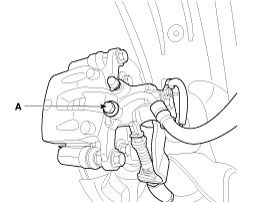
Remove the front wheel & tire.
Tightening torque :
88.3 ~ 107.9 N.m (9.0 ~ 11.0 kgf.m, 65.1 ~ 79.6 lb-ft)
Remove the hose eyebolt (A).
Tightening torque :
24.5 ~ 29.4 N.m (2.5 ~ 3.0 kgf.m, 18.1 ~ 21.7 lb-ft)

Remove the parking brake cable (A), after removing the clip (B).
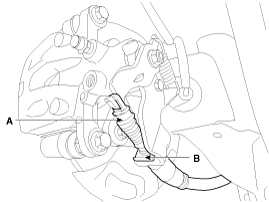
Parking brake lever in the car must be in fully loosened position.
Loosen the guide rod bolt (B) and the remove the rear caliper body (A).
Tightening torque :
21.6 ~ 31.4 N.m (2.2 ~ 3.2 kgf.m, 15.9 ~ 23.1 lb-ft)
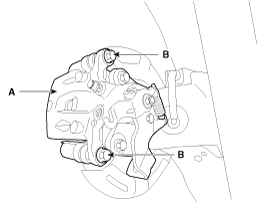
Remove the brake pads (B) and pad retainers (C) in the caliper carrier (A).
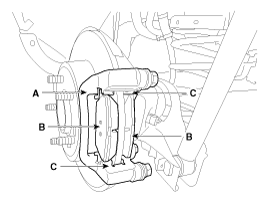
Loosen the caliper mounting bolts (B) and then remove the caliper carrier (A).
Tightening torque :
63.7 ~ 73.5 N.m (6.5 ~ 7.5 kgf.m, 47.0 ~ 54.2 lb-ft)
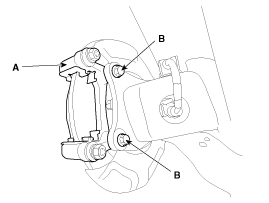
Remove the front wheel & tire.
Tightening torque :
88.3 ~ 107.9 N.m (9.0 ~ 11.0 kgf.m, 65.1 ~ 79.6 lb-ft)
Loosen the guide rod bolt (B) and the remove the rear caliper body (A).
Tightening torque :
21.6 ~ 31.4 N.m (2.2 ~ 3.2 kgf.m, 15.9 ~ 23.1 lb-ft)
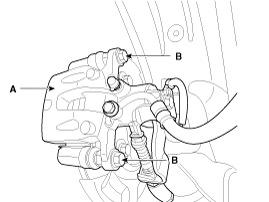
Remove the brake pads (B) and pad retainers (C) in the caliper carrier (A).

Loosen the caliper mounting bolts (B) and then remove the caliper carrier (A).
Tightening torque :
63.7 ~ 73.5 N.m (6.5 ~ 7.5 kgf.m, 47.0 ~ 54.2 lb-ft)

Remove the rear brake disc by loosening the screws (A).
Tightening torque :
4.9 ~ 5.9 N.m (0.5 ~ 0.6 kgf.m, 3.6 ~ 4.3 lb-ft)
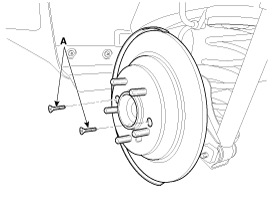
Remove the front wheel & tire.
Loosen the guide rod bolt (B) and the remove the rear caliper body (A).
Tightening torque :
21.6 ~ 31.4 N.m (2.2 ~ 3.2 kgf.m, 15.9 ~ 23.1 lb-ft)

Replace pad retainers (C) and brake pads (B) in the caliper carrier (A).

Rotate the caliper piston and push the direction of the arrow.
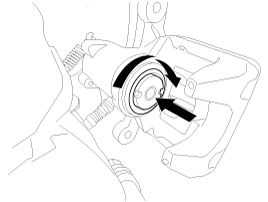
Place the caliper body (A) on the caliper carrier and tighten the guide rod bolt (B).
Tightening torque :
21.6 ~ 31.4 N.m (2.2 ~ 3.2 kgf.m, 15.9 ~ 23.1 lb-ft)

Assemble the caliper body so that the piston groove (A) is in-line with the pad center lobe (B).
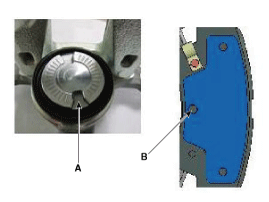
* Make sure that the piston and pad are tightly attached.
Install the front wheel & tire.
Tightening torque :
88.3 ~ 107.9 N.m (9.0 ~ 11.0 kgf.m, 65.1 ~ 79.6 lb-ft)
Check the brake pads for wear and fade.
Check the brake disc for damage and cracks.
Remove all rust and contamination from the surface, and measure the disc thickness at 8 points, at least, of same distance (5mm) from the brake disc outer circle.
Brake disc thickness
Standard: 10 mm (0.393 in)
Service limit: 8.4 mm (0.331 in)
Deviation: Less than 0.005mm (0.0002in)
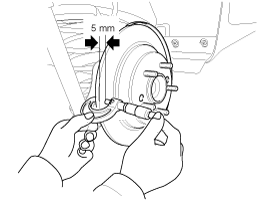
If wear exceeds the limit, replace the discs and pad assembly left and right of the vehicle.
Check the pad wear. Measure the pad thickness and replace it, if it is less than the specified value.
Pad thickness
Standard value: 10 mm (0.394 in)
Service limit: 2.0 mm (0.0787 in)
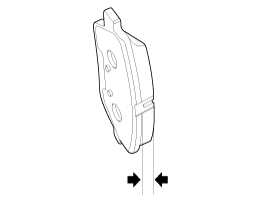
Check that grease is applied, to sliding contact points and the pad and backing metal for damage.
Place a dial gauge about 5mm (0.2 in.) from the outer circumference of the brake disc, and measure the runout of the disc.
Brake disc runout
Limit: 0.05 mm (0.0020 in.) or less (new one)
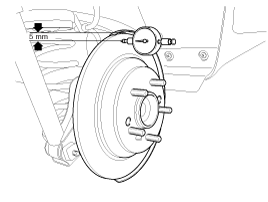
If the runout of the brake disc exceeds the limit specification, replace the disc, and then measure the runout again.
If the runout does not exceed the limit specification, install the brake disc after turning it 180° and then check the runout of the brake disc again.
If the runout cannot be corrected by changing the position of the brake disc, replace the brake disc.
Install in the reverse order of removal.
Rotate the caliper piston and push the direction of the arrow.

After installation, bleed the brake system. (Refer to Brake system bleeding)
Install in the reverse order of removal.
Rotate the caliper piston and push the direction of the arrow.
